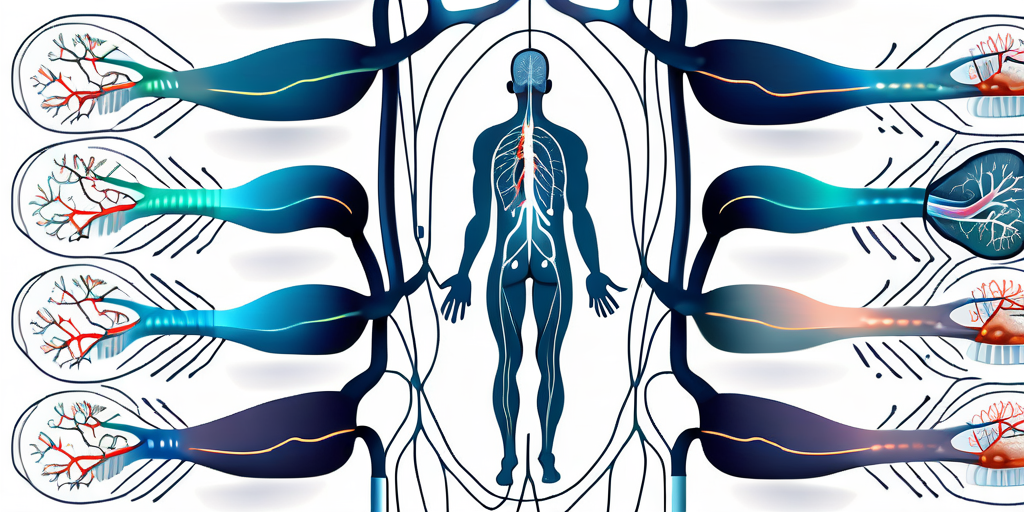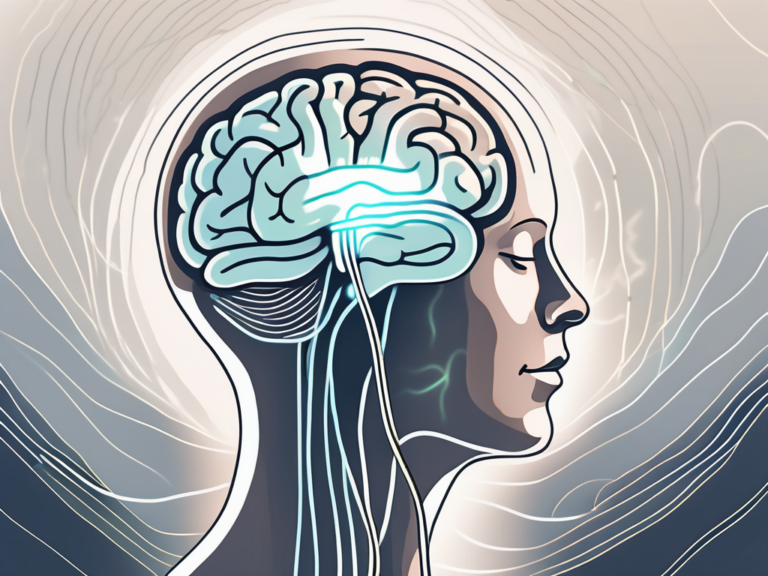can you feel vagus nerve activate with meditation
Meditation has long been recognized as a powerful practice that promotes relaxation and overall well-being. But did you know that it can also have a profound impact on the vagus nerve? In this article, we will explore the fascinating connection between meditation and the activation of the vagus nerve, as well as the physical and emotional sensations associated with it. So, sit back, relax, and get ready to dive into the world of vagus nerve activation through meditation.
Understanding the Vagus Nerve
The vagus nerve, also known as the cranial nerve X, is one of the longest cranial nerves in the body. It originates in the brainstem and extends down through the neck, chest, and abdomen, making connections with various organs and systems along the way. As part of the parasympathetic nervous system, the vagus nerve plays a crucial role in regulating many bodily functions, including heart rate, digestion, and breathing.

The Role and Function of the Vagus Nerve
The primary function of the vagus nerve is to promote rest and relaxation by counteracting the body’s stress response. When activated, it helps the body enter a state of calmness and balance, often referred to as the “rest and digest” mode. This mode allows the body to conserve energy, facilitate digestion, and promote overall healing.
The Connection Between the Vagus Nerve and the Body’s Functions
The vagus nerve connects with various organs and systems within the body, including the heart, lungs, digestive tract, and even the spleen. Through its intricate network of fibers, it relays information between the brain and these organs, regulating their function accordingly. This connection ensures the smooth coordination of bodily processes and maintains overall homeostasis.
Let’s delve deeper into the fascinating world of the vagus nerve. Did you know that the vagus nerve is not just involved in regulating physical functions, but also plays a role in our emotional well-being? It has been found that the vagus nerve is closely linked to our ability to experience and express emotions. When the vagus nerve is functioning optimally, it helps us feel calm, content, and emotionally balanced. On the other hand, if the vagus nerve is not functioning properly, it can lead to emotional imbalances, such as anxiety and depression.
Furthermore, recent research has uncovered an intriguing connection between the vagus nerve and the immune system. It has been discovered that the vagus nerve can communicate with immune cells, influencing their activity and response. This means that the vagus nerve not only regulates bodily functions but also has a direct impact on our immune system’s ability to fight off infections and maintain overall health.
The Science Behind Vagus Nerve Stimulation
Scientists have been studying the effects of vagus nerve stimulation for decades, and the results are quite remarkable. By stimulating the vagus nerve, either through electrical impulses or non-invasive techniques like meditation, researchers have observed numerous positive effects on both physical and mental health.
The Biological Process of Vagus Nerve Activation
When the vagus nerve is activated, it releases chemicals and neurotransmitters that promote relaxation, such as acetylcholine and oxytocin. These substances help reduce inflammation, lower blood pressure, and increase feelings of well-being. Additionally, vagus nerve activation leads to a decrease in the production of stress hormones like cortisol, further aiding in the promotion of calmness and balance.
The Impact of Vagus Nerve Stimulation on Health
Research suggests that vagus nerve stimulation can have a positive impact on various aspects of health. Studies have shown that it may help alleviate symptoms of depression, anxiety, and chronic pain. It has also been found to enhance immune function, improve digestion, and promote better sleep. Additionally, vagus nerve activation has been linked to increased cognitive performance and a stronger ability to regulate emotions.
Furthermore, recent research has explored the potential of vagus nerve stimulation in the treatment of neurological disorders such as epilepsy and Parkinson’s disease. Preliminary studies have shown promising results, with some patients experiencing a reduction in seizure frequency and improved motor function.
Moreover, the benefits of vagus nerve stimulation extend beyond the realm of physical health. Psychologists have begun investigating its potential in treating conditions like post-traumatic stress disorder (PTSD) and addiction. By modulating the vagus nerve, it is believed that individuals may experience a reduction in the intensity of traumatic memories and cravings, leading to improved overall well-being.
It is important to note that while vagus nerve stimulation shows great promise, further research is still needed to fully understand its mechanisms and potential applications. Scientists continue to explore different techniques and refine existing methods to optimize the therapeutic benefits of vagus nerve stimulation.
Meditation and the Vagus Nerve
One of the most accessible and natural ways to activate the vagus nerve is through meditation. By engaging in mindful practices, individuals can tap into the power of their own breath and thoughts to stimulate this important nerve.
The Link Between Meditation and Vagus Nerve Activation
During meditation, the focus on slow, deep breathing triggers the activation of the vagus nerve. This deep diaphragmatic breathing stimulates the relaxation response and signals to the body that it is safe to relax and let go. As this happens, the vagus nerve’s activity increases, leading to a cascade of positive effects throughout the body.
When the vagus nerve is activated, it releases neurotransmitters such as acetylcholine, which helps to regulate heart rate, blood pressure, and digestion. This activation also promotes the release of oxytocin, often referred to as the “love hormone,” which enhances feelings of connection, trust, and well-being. Additionally, the vagus nerve plays a crucial role in the regulation of inflammation, immune response, and stress levels.
Different Meditation Techniques for Vagus Nerve Stimulation
There are various meditation techniques that can help stimulate the vagus nerve. One popular method is the practice of loving-kindness meditation, where individuals cultivate feelings of compassion and empathy towards themselves and others. By directing positive intentions and well-wishes towards oneself and others, this practice activates the vagus nerve, promoting a sense of emotional well-being and social connectedness.
Another technique is the body scan meditation, which involves systematically bringing awareness to each part of the body, promoting a deep sense of relaxation. As individuals focus their attention on different areas of the body, they activate the vagus nerve, allowing it to send signals of calmness and relaxation throughout the entire system. This practice not only helps to alleviate physical tension but also cultivates a heightened sense of body awareness and self-compassion.
Furthermore, mindfulness meditation, where individuals observe their thoughts and emotions without judgment, has also been found to stimulate the vagus nerve. By bringing attention to the present moment and accepting whatever arises, individuals activate the vagus nerve’s calming influence, reducing stress and promoting emotional resilience.
Sensations Associated with Vagus Nerve Activation
When the vagus nerve is activated through meditation, individuals may experience a range of physical and emotional sensations. These sensations are often indicative of the nerve’s influence on various bodily systems.

Physical Sensations During Vagus Nerve Stimulation
Some individuals report feeling a warm, comforting sensation spreading throughout their body during vagus nerve activation. They may also notice a decrease in heart rate, a sense of deep relaxation, and a release of muscle tension. Additionally, improved digestion and a reduction in inflammation are common physical experiences associated with vagus nerve stimulation.
During vagus nerve activation, individuals may also experience a heightened sense of bodily awareness. This increased awareness allows them to notice subtle shifts in their physical sensations, such as a gentle tingling or a soft pulsation in different parts of their body. It’s as if the nerve’s activation opens a doorway to a deeper connection with their own physical being.
Emotional and Psychological Experiences of Vagus Nerve Activation
Vagus nerve activation through meditation can also have profound emotional and psychological effects. Individuals often report an increase in feelings of calmness, contentment, and overall well-being. They may also experience a greater ability to handle stress, improved mood, and enhanced emotional resilience.
As the vagus nerve is intricately connected to the brain and plays a crucial role in regulating emotions, its activation can lead to a heightened sense of emotional awareness. Individuals may find themselves more attuned to their own feelings and emotions, allowing them to navigate their inner landscape with greater clarity and understanding. This newfound emotional awareness can bring about a sense of inner peace and harmony.
The Benefits of Vagus Nerve Activation Through Meditation
The benefits of stimulating the vagus nerve through meditation are vast and multi-faceted. By incorporating regular meditation practice into your life, you can experience improvements in both your physical and mental health.
But what exactly is the vagus nerve and how does it work? Well, the vagus nerve is the longest cranial nerve in your body, connecting your brain to various organs such as the heart, lungs, and digestive system. It plays a crucial role in regulating your body’s response to stress and maintaining overall balance.
Health Benefits of Vagus Nerve Stimulation
Vagus nerve activation has been linked to a variety of health benefits. It can help lower blood pressure, reduce inflammation, and improve heart health. When the vagus nerve is stimulated, it sends signals to the brain that help regulate heart rate and blood pressure, promoting a state of calm and relaxation.
Furthermore, vagus nerve stimulation may enhance immune function, boost digestion, and alleviate symptoms of chronic illnesses such as migraines and fibromyalgia. This is because the vagus nerve is intricately connected to the immune and digestive systems, and by activating it through meditation, you can support their optimal functioning.
Mental and Emotional Advantages of Vagus Nerve Activation
Activating the vagus nerve through meditation can also have profound effects on mental and emotional well-being. It can help reduce symptoms of anxiety and depression by increasing the production of mood-enhancing neurotransmitters such as serotonin and dopamine.
Moreover, vagus nerve activation may improve focus, concentration, and overall cognitive function. When the vagus nerve is stimulated, it enhances the release of acetylcholine, a neurotransmitter that plays a crucial role in learning and memory. This can lead to improved mental clarity and cognitive performance.
So, by incorporating regular meditation practice into your life, you can not only experience the physical benefits of vagus nerve stimulation but also enjoy improved mental and emotional well-being. Take a moment each day to connect with your breath, quiet your mind, and activate your vagus nerve through meditation. Your body and mind will thank you.
Frequently Asked Questions About Vagus Nerve and Meditation
Common Misconceptions About Vagus Nerve Activation
There are several misconceptions surrounding the activation of the vagus nerve through meditation. Some believe that it is only achievable by experienced meditators or that it requires a long time commitment. However, the truth is that anyone can stimulate their vagus nerve through meditation, regardless of their level of experience. Even a few minutes of intentional deep breathing can have a beneficial effect on vagus nerve activity.

Addressing Concerns About Meditation and Vagus Nerve Stimulation
Individuals may have concerns about the safety or effectiveness of vagus nerve stimulation through meditation. It is important to note that meditation is generally considered safe and has minimal side effects. However, if you have any pre-existing medical conditions, it is always advisable to consult with a healthcare professional before starting any new practice. Additionally, it is essential to find a meditation technique that suits your specific needs and preferences to ensure a positive experience.
Now, let’s delve deeper into the fascinating world of the vagus nerve and its connection to meditation. The vagus nerve, also known as the “wandering nerve,” is the longest cranial nerve in the body. It originates in the brainstem and extends down to various organs in the body, including the heart, lungs, and digestive system.
When it comes to meditation, the vagus nerve plays a crucial role in promoting relaxation and reducing stress. It acts as a communication highway between the brain and the body, transmitting signals that regulate heart rate, breathing, digestion, and even the release of certain hormones. By activating the vagus nerve through meditation, you can tap into its potential to bring about a state of calm and balance.
Research has shown that vagus nerve activation through meditation can have a wide range of benefits. It can help lower blood pressure, reduce inflammation, improve digestion, and enhance overall well-being. Additionally, stimulating the vagus nerve can boost the production of neurotransmitters like serotonin and dopamine, which are known as the “feel-good” chemicals in the brain.
So, how exactly does meditation activate the vagus nerve? One of the key mechanisms is through deep, diaphragmatic breathing. When you take slow, deep breaths that engage the diaphragm, it sends a signal to the vagus nerve to activate the relaxation response in the body. This, in turn, triggers a cascade of physiological changes that promote a sense of calm and relaxation.
As you can see, the connection between meditation and vagus nerve activation is a fascinating topic with far-reaching implications. By incorporating meditation into your daily routine, you can harness the power of the vagus nerve to promote relaxation, improve overall health, and enhance your well-being. So, take a deep breath, find a quiet space, and embark on your journey to activate your vagus nerve through the transformative practice of meditation.






